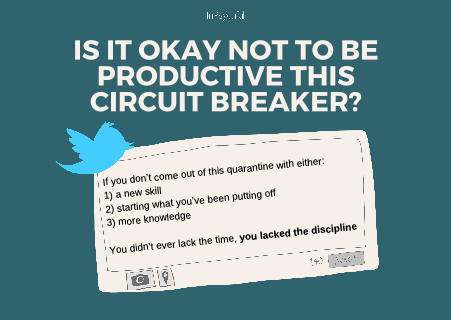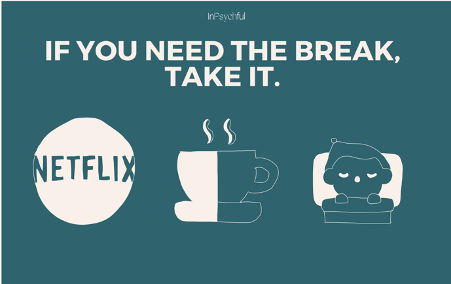This tweet sparked off a huge debate, with many retweeting this, while others raged at how the tweet painted the pandemic to be a vacation. Recently, there has been a debate between acknowledging that “This is not a productivity contest”, and the flip side, “you lacked discipline”.
This article seeks to answer both sides of this debate from a psychological perspective, taking into consideration different perspectives and situations that you might have overlooked when you retweeted that tweet. Perhaps this article can also serve as a reminder that everyone’s Circuit Breaker experience looks different, and that is okay.
1. Your current season might look different from another person’s, and you have to learn to be okay with it.
If you’re a parent, chances are, Circuit Breaker means dedicating more of your time to your children. While some moments are filled fun and laughter, more often than not you catch yourself scolding your children for spilling that bowl of soup, or find yourself cleaning up the mess they leave behind. Circuit Breaker doesn’t always mean more time for all of us. More often than not, Circuit Breakers means heavier workload, more overtime and more time and attention spent on your children.
According to our social roles, our responsibilities during Circuit Breaker are bound to be different. Perhaps you’re a student and as you enter into your summer break, you have no responsibilities for the next few months. Perhaps you’ve recently lost your job and you just need a break from anxiously searching for jobs openings. Perhaps you’re not in a good place right now and you can’t bring yourself to face a never-ending to do list.
At the end of the day, our to-do lists looks different and it is okay if baking, picking up an online course and working out daily are not on your list.
2. Doing more allows us to feel more in control of our lives
While this period of time might be a good opportunity for those who can afford the time and mental capacity to pick up a new skill, it will also be helpful for us to realise understand why we feel the need to do something with our lives.
Perhaps, you find yourself feeling the need to do something productive everyday. Before we quickly justify if these acts are healthy or not, it is important to unpack the underlying reasons for our behaviors. Like panic-buying behavior, perhaps the unpredictability of when Circuit Breaker will finally come to end that propels Singaporeans to take action by doing more of their current situation.
In general, all of us have an innate need to have a sense of control. At this point, it is also important to distinguish that sense of control doesn’t mean control itself (The Need for a Sense of Control, n.d.). While we might not be in control of everything, we can do certain things to have a sense of control. Perhaps to have that sense of control means to make the most out of the time you spend at home this Circuit Breaker. To some, that might look like taking an interesting online class or exploring a new hobby. However, to other, having a sense of control might simply mean finishing the given tasks by your boss, or successfully putting your child to sleep without him/her waking up in the middle of the night.
3. Growth mindset
Though the tweet comes across harshly, the underlying intention of it is to focus on one’s desire to learn and grow. Indeed, for those who find themselves having extra time, this Circuit Breaker poses an attractive window for us to do things we never had time to do, or pick up something new with our friends.
The term “Growth mindset” was coined by Carol Dweck (2015):
In a growth mindset, people believe that their most basic abilities can be developed through dedication and hard work—brains and talent are just the starting point. This view creates a love of learning and a resilience that is essential for great accomplishment.
(Dweck, 2015)
It is not necessarily a bad thing that you want to work on yourself of your existing skills during this Circuit Breaker. Having a growth mindset draws you to learning, and the process of learning and growing, and you should not have to feel bad for wanting to be a better version of yourself.
4. Social Learning theory – The role of social media in this debate
However, it is also important to understand if you are being drawn to learning because of intrinsic motivations (“I want to learn to code because it will be useful when I find a job”), or extrinsic motivations (“Wow, Alistair is learning how to code… maybe I should do it too so I don’t lose out.”).
Indeed, seeing someone else on social media making the most of their time can inspire you to make the most out of your time. Social learning can take place even through social media, whereby just seeing someone being productive with their time, can lead to us modelling after it. According to Albert Bandura’s social learning theory (1977), this is how social learning of “being productive” via social media can look like.
But, when it becomes a productivity contest, you have to be able to catch yourself when you find yourself making comparisons to the people around you. When it becomes a productivity contest, it can slowly become more harmful than beneficial.
5. If you need the break, take it.
Recognize the times when speed seems ridiculous,
– Stack (Tartakovsky, 2018)
Living in a fast pace society, how often can we hit a pause in life? It definitely is much easier as a student, with summer holidays being a needful break for many of us. However, as working adults, breaks and rest days are short-lived. Some of us have to work even on Public Holidays. It is important for us to know our limits, and to take breaks when we need it. To assume that every pocket of free time we have has to be channelled into doing something productive might not be feasible for all of us. Maybe some of us just need to take a short walk to take our minds off work matters, and maybe some of us just need to snuggle in bed and Netflix.
One of the ways we can overcome the nagging thought of needing to do everything is to practice counter thoughts. If you find yourself constantly doing something from morning to night, and still feeling like you need to do more, you can try these counter thoughts.
According to Lucy Jo Palladino, a clinical psychologist who described herself as a “non-stop do-er practically since birth,” she recommended using the following counter-thoughts that has been really helpful (Tartakovsky, 2018):
- I am a human being, not a human doing.
- I am worthy.
- When I sleep, sit still, or daydream, I’m still a precious and complex mystery of life.
At the end of the day, only you will be able to answer the questions above – if it is okay for you not to be productive this Circuit Breaker. You might not be the most productive interms of picking up the most number of skills, but productivity is subjective for everyone. It is imperative for us to recognise that it depends where we are at, to decide for ourselves if taking a break or picking up a new skill is more beneficial for us. To impose what looks good to others on ourselves will only make it hard for you to take a break when speed and productivity seems ridiculous. If we can all come to realize that we are all going through different seasons of life, we will be able to accept that our productive and rest days will inevitably different from each other’s.
References
Bandura, A. (1977). Social learning theory. Englewood Cliffs, NJ: Prentice Hall.
Dweck, C.S. (2015), Growth. Br J Educ Psychol, 85: 242-245. doi:10.1111/bjep.1207
Tartakovsky, M. (2018, October 8). 12 Ideas for Overcoming the Pressure to be Super Productive. Retrieved from https://psychcentral.com/lib/12-ideas-for-overcoming-the-pressure-to-be-super-productive/
The Need for a Sense of Control. (n.d.). Retrieved May 19, 2020, from http://changingminds.org/explanations/needs/control.htm






